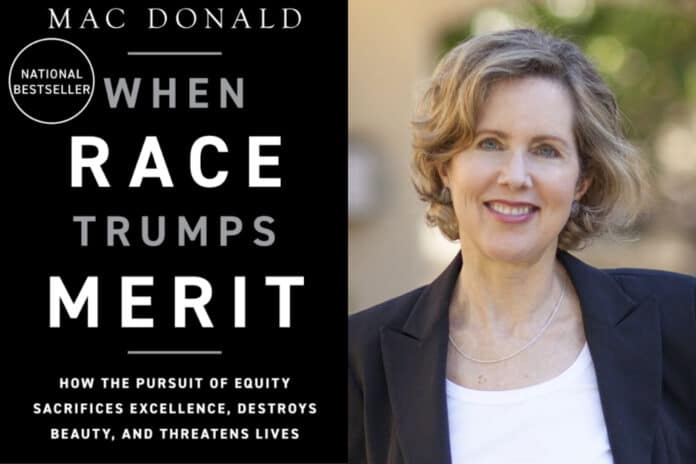Heather Mac Donald’s just released book, “When Race Trumps Merit,” is a clarion call to arms. The race to abandon merit is leading “to a country violently divided along racial lines.” We need to stand up and defend “color-blind standards of achievement and behavior.”
This book is fundamentally about justice. Augustine taught us that Justice means “giv(ing) to another what belongs to him.” It is simply not possible to give a person his due without acknowledging his merit.
“Diversity, Equity and Inclusion” and “anti-racism” are the current fashion and obsession of our cultural elites. Every decision must be made using the lens of race, even if it means rejecting merit. DEI is based on the false premise that over and underrepresentation in the bads and goods of our society are due to race, when in truth racial disparities are overwhelmingly due to massive and longstanding gaps in skills, and to the complete breakdown of the nuclear black family.
Mac Donald gives us many stories of heroes who have refused to be bullied and who have stood up for merit and the truth. In medicine she tells the story of Stanley Goldfarb at the University of Pennsylvania Medical School. In 2022 the DEI elites studied the scores of black internal medicine residents and offered three explanations for the racial disparity: racial bias, a non-inclusive learning environment, and structural inequities in assessment. Goldfarb tweeted a fourth possibility: “Could it be (the minority students) were just less good at being residents?” The chair of Penn’s Department of Medicine called Goldfarb “a garbage human being.”
Goldfarb was crushed and shunned by everyone at Penn for speaking the truth: there is a shocking racial disparity in academic and resident performance. The average MCAT for white applicants is in the 71st percentile, while the average MCAT for black applicants is in the 37th percentile — a full standard deviation separates the two. Blacks, in the name of diversity and inclusion, are given preferences in admission. Eight percent of whites with below average undergraduate GPAs are admitted versus 56 percent of blacks; a black student is seven times more likely than a white student to be admitted to medical school. Disparities in the academic performance of black versus white medical students are the predictable outcome of these admission preferences. The charge of racism is beyond bogus, for the racism is flowing in the other direction, against whites.
Mac Donald gives us the story of another bully: Northwestern Medical School, which refused to give so much as an interview to a “white clean-cut Catholic” who was a Yale graduate with a Bachelor of Science in molecular biology and bio-chemistry, the best lab technician his recommending physician scientist had seen in 30 years.
Another hero: Norman Wang, who was the director of the Electrophysiology Fellowship Program at the the University of Pittsburgh Medical Center. He called for the color-blind evaluation of future doctors based on their “personal merits” rather than on their racial identities. A more perfect example of Augustinian justice you could not find. Again the race bullies came out. The director of Diversity and Inclusion at the Mayo Clinic said that Wang’s paper “should both enrage and activate all of us.” The president-elect of the American Medical Association called Wang’s paper “unbalanced, unscientific, and untrue” (of course not a single example of same provided). The Journal of the American Heart Association withdrew Wang’s paper, and apologized and retracted the paper. Wang was of course fired.
These race bullies are willing to overlook the truth (a complimentary virtue to justice) that there is an academic skills gap “confirmed in every measure of knowledge before and during medical school, which does not close over the course of medical training, despite remedial instruction,” Mac Donald writes.
Mac Donald tells us how merit is being silenced in science just as in medicine. Astronomer John Kormendy proposed a method for reducing the role of individual subjectivity in scientific hiring and tenure decisions by using a model that predicted a scientist’s long-term research impact from the citation history of his early publications. One Viviana Aquaviva from the City University of New York tweeted that Kormendy had “JUST TOOK ANY TINY STEPS WE ARE MAKING TOWARDS EQUITY AND THREW THEM OUT THE WINDOW.” Kormendy was forced by the DEI advocates to withdraw his paper and apologize. The race bullies won over merit.
Mac Donald lays out similar stories in the arts. Dona Vaughan lost her longtime role as artistic director of opera at the Manhattan School of Music because she had cast a black singer as a butler. Notwithstanding that many of opera’s leading roles were black servants (Leporello and Figaro and Susanna), the race bullies at the school started a petition and Vaughan was fired. At Juilliard School, Michael McElroy, who is black, offered a three-day workshop exploring the journey of black people in America. The black president of the student union accused McElroy of cultural appropriation and creating trauma through the “auditory experience of enslavement.” One of her demands was that the school drop from the academic records of black students absenteeism and tardiness. The workshop was terminated by the school.
One of Mac Donald’s most compelling stories is about the Art Institute of Chicago. The Institute fired the entire corps of almost one hundred volunteer docents, because most of them were white. They were let go plain and simple because of their race. These docents had given years of service to the Institute and to thousands upon thousands of visitors.
Mac Donald laments that there are not more heroes willing to stand up for merit, while at the same time she sympathizes with those who know the truth but remain silent. She asked a cancer researcher why the white and Asian researchers who were consistently shut out by the DEI quotas didn’t fight back. This is from the email she received in response:
“Our peers will turn on us … I admire the bravery of those who speak out but they are being exterminated … [they will] systematically be exterminated until they are all gone.”
The consequences of race-based decision-making and the abandonment of merit are on multiple levels.
The first consequence falls on the thousands upon thousands of whites and Asians who are silently being denied places in schools, jobs, promotions, and professional positions in the name of DEI. These are people who have spent their entire life acquiring the skills and knowledge required for success in their chosen field, only to see someone less qualified receive the position they worked and strived so hard for, all in the name of “equity.” It won’t do to say that this is simply a necessary consequence of remedying an existing racial imbalance. The racial imbalance is real: blacks make up 13 percent of our population yet they represent a much smaller percentage of college and graduate enrollment and professional populations. But this is not due to systemic racism but rather to a massive skills gap. Only 13 percent of black third-grade boys in Minneapolis Public Schools can pass a simple reading test. This reading deficiency continues through primary school and high school. Unless you can read, you cannot learn, and if you cannot learn, you cannot be a scientist, or doctor, or lawyer, or teacher, or musician. DEI quotas do nothing to address this problem.
Denying a position to the most qualified applicant has an impact beyond the individual suffering the discrimination — from that inequity flows an impact on the overall quality of medicine, science, law, and the arts. As we abandon merit, the meritorious will lose heart. “It’s the end of the road for me as a Jewish male doctor,” a cancer researcher told Mac Donald. “The best and the brightest will not enter a field that has been degraded in this fashion.”
The DEI regime further debases medicine and science and the other professions by dropping objective measures of knowledge and skill altogether. They know that if they use the ACT, SAT, LSAT, MCAT and other objective measures that accurately measure requisite knowledge and skill, they cannot remedy the existing racial imbalance, because blacks do not perform as well on these objective measures. When these measures are dropped, the quality of the student body declines. There is a reason MIT reinstituted its admission test — it found a dramatic increase in failure when it dropped the test. Moreover, if we drop admission tests, students simply won’t study as hard in lower grades. If they don’t need to pass any test to be admitted to college or law school or medical school, why study? The entire system will be “dumbed down.”
A further consequence of DEI’s war on merit is the demise of our Western tradition in favor of race-based music, art and literature. Forget the good, the true, and the beautiful, no matter their merit. Out go Gibbon, Dostoevsky, Mozart, Michelangelo, Shakespeare, Einstein, Socrates, and the lot of them. The content and the quality of every facet of our society will be grossly debased as merit is abandoned in favor of race.
Mac Donald speaks the truth when she says: “The vast majority of white Americans are decent, well-meaning people who yearn for a post-racial country and don’t give a damn about race.” Her book needs to be read and we need to stand up and speak the truth, and fight for a color-blind society. There are brave heroes out there who are working to address racial disparities without abandoning merit. Mac Donald names these, including our own Kendall and Sheila Qualls, who are working on the restoration of intact black families and choice in education. Pick a cause — mine is ensuring that every child learns to read by the end of the third grade, using good old fashioned (and lately abandoned) phonics.
Mac Donald has armed us with her book, now let’s get moving!

















